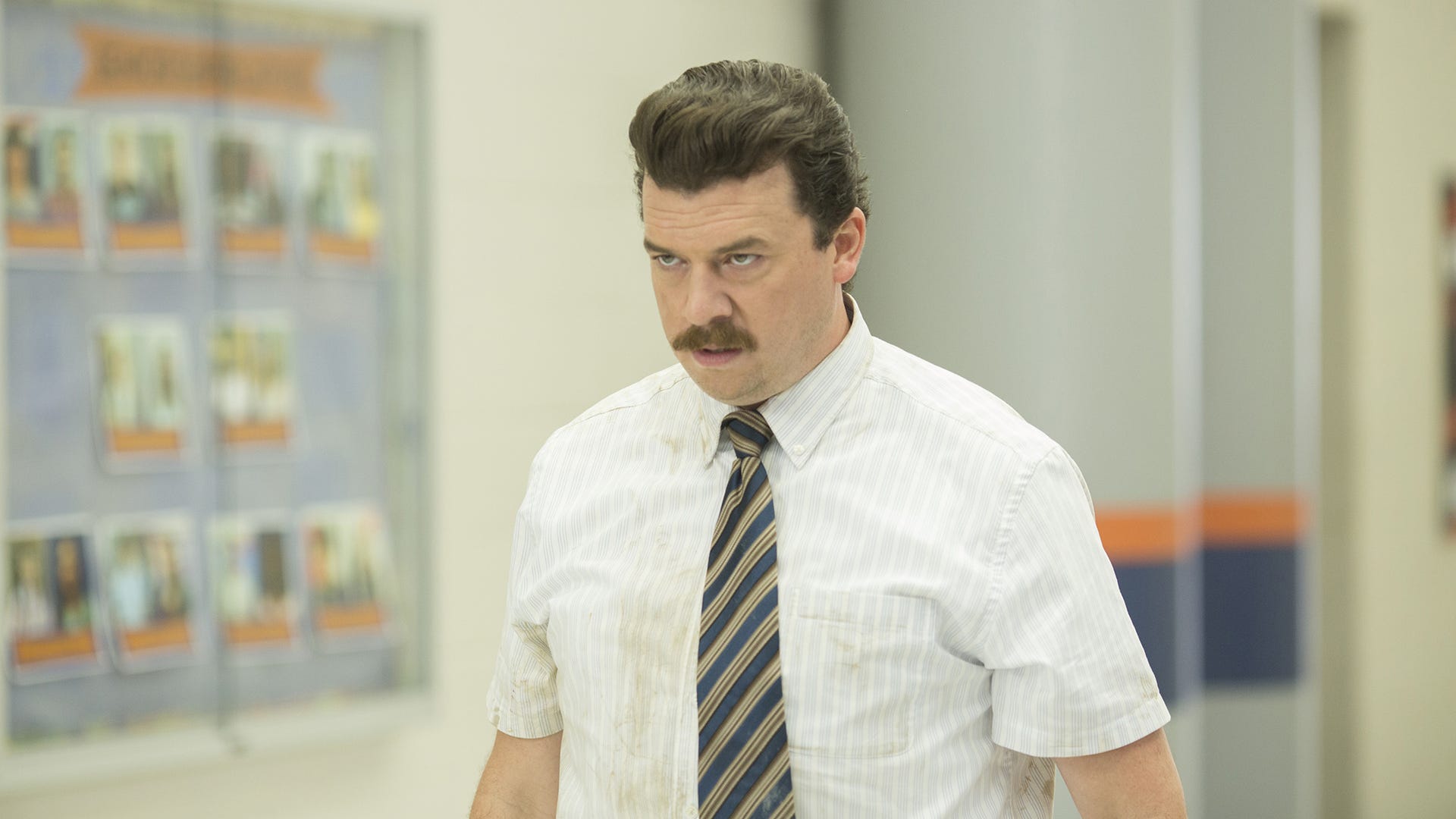Join or Sign In
Sign in to customize your TV listings
By joining TV Guide, you agree to our Terms of Use and acknowledge the data practices in our Privacy Policy.
Vice Principals' Danny McBride on That Morally Complicated Series Finale
The finale asks interesting questions about abuse of power
Vice Principals, Danny McBride and Jody Hill's hilarious HBO black comedy, chronicled the rise and fall of Neal Gamby (McBride) and Lee Russell (Walton Goggins) over two seasons. Season 1 was about Gamby and Russell trying to oust principal Dr. Belinda Brown (Kimberly Hebert Gregory) by any means necessary so they could take her place. Season 2 found Gamby struggling with his conscience while trying to figure out who shot him in the Season 1 finale, while Russell gradually lost everything he had.
In Sunday's series finale, Gamby learned that the shooter was his crazy ex-girlfriend, Spanish teacher Jen Abbott (Edi Patterson), which solved Season 2's main plot puzzle, but other resolutions were fascinatingly elusive. Gamby and Russell don't face what most would think are just consequences for the horrible things they did, most criminally burning down Brown's house but including their moment-to-moment awfulness of racism, sexism, bullying and wanton cruelty. Gamby gets the girl, Amanda Snodgrass (Georgia King), who helps sand down his sharp edges, and lands a job as the principal of the middle school, which is not the job he wanted, but it's a job. Russell becomes the regional manager of a chain of women's clothing stores and stays the same mean bastard he always was, now with a black glove on his hand to cover up the scars from where the tiger bit him.
The finale comes at an interesting time culturally. The series was shot two years ago, but its themes of men being held accountable for their actions (or not) feel more relevant than ever. And where the characters land -- in a purgatorial state between escape and punishment -- reflects the uncomfortable reality of how blurry and incomplete justice can be.
Vice Principals Is Further Proof That Walton Goggins Makes Everything Better
"The world isn't, as Gamby would say, a teen movie," McBride tells TV Guide. "Things don't always go how they're supposed to and unfortunately we don't always make the choices that we're supposed to."
To McBride, this kind of story is always relevant regardless of what's happening in culture at large because it deals with human flaws that have always existed. "I think the fact that this f---ed up journey these guys go on happens to resonate with things that are going on in our world now is because this is a story about how flawed humans can be when they go for what they think they deserve and how much they're willing to compromise themselves for what they ultimately think will fix them."
Edi Patterson, who plays Abbott, thinks the show's ending is authentic to real life. "I think karmically they got exactly what real, flawed people get," she tells TV Guide in a separate interview. "They make a lot of mistakes and as a result some bad things happen but they also get some awesome payoffs. It's super gray."
The show always presents Gamby and Russell as terrible people, but it intentionally doesn't take a moral stand on whether or not Gamby and Russell get what they deserve. It leaves that up to the viewer to decide. "I think that ultimately makes for a world that's more interesting when you step back from it because the whole world isn't just wrapped up nicely," says McBride. "There's things to think about and discuss."
That being said, he doesn't think Gamby got off easy in terms of the damage he did to himself. North Jackson High School was the most important thing in his life, and not getting the principal job after compromising himself so much in pursuit of it stings him more than if he had gone to jail.
"The job was all that ever mattered to him," says McBride. "In the first episode, Gamby doesn't have a family. He doesn't have anything. He has how he's seen at work and what he thinks that position will bring him. And so for him to lose that, I think to all of us that might not seem like a big deal, but to a guy who's wired like Gamby, I think it's a tragedy, almost."

Danny McBride, Vice Principals
Fred NorrisAt a time when men are being held accountable for abuse of power more than ever before but it's still unclear what exactly full accountability should look like -- this week, a once-beloved and powerful comedian is being torn apart by some for issuing an apology for sexually harassing women that mentions how admired he was four times but never contains the words "I'm sorry" while being defended by others who see him as a sick man who has to live with himself and is remorseful for what he's done -- the timing of Vice Principals' ambivalent finale is striking. It offers no easy answers for what the punishment for abuse of power should be beyond not having it. It knows that Gamby and Russell are wrong, but it doesn't have a solution for what to do with them. It understands how white men who think the world owes them think and it disapproves of them but doesn't condemn them.
"A thing I find interesting -- and this is with a lot of Danny and Jody and David's work -- is that it's such a cool and complicated exploration of what it means to be a guy," says Patterson. "And they sort of lampoon that and dissect it in such a complicated and awesomely surgical and funny way."
The Vice Principals finale doesn't tell you how to feel. It's just asking the questions. How you answer them says a lot about how you see the world.
